UPES Dehradun BA Admissions 2026
Last Date to Apply: 25th Feb | Ranked #45 Among Universities in India by NIRF | 1950+ Students Placed, 91% Placement, 800+ Recruiters
Preparing for CUET Mathematics 2026 in just one month may seem challenging, but with the right strategy, focused practice, and a clear understanding of the exam pattern, you can significantly boost your scores. CUET Mathematics 2026 emphasises key topics like Algebra, Geometry, Calculus, Probability, and Statistics, along with speed and accuracy in solving numerical problems. Concentrated revision, solving CUET previous years’ question papers, and mastering important formulas are crucial for last-minute preparation. In this article, we will guide you through a structured 1-month preparation plan for CUET 2026 Mathematics, helping you focus on high-yield topics and achieve your target score.
This Story also Contains
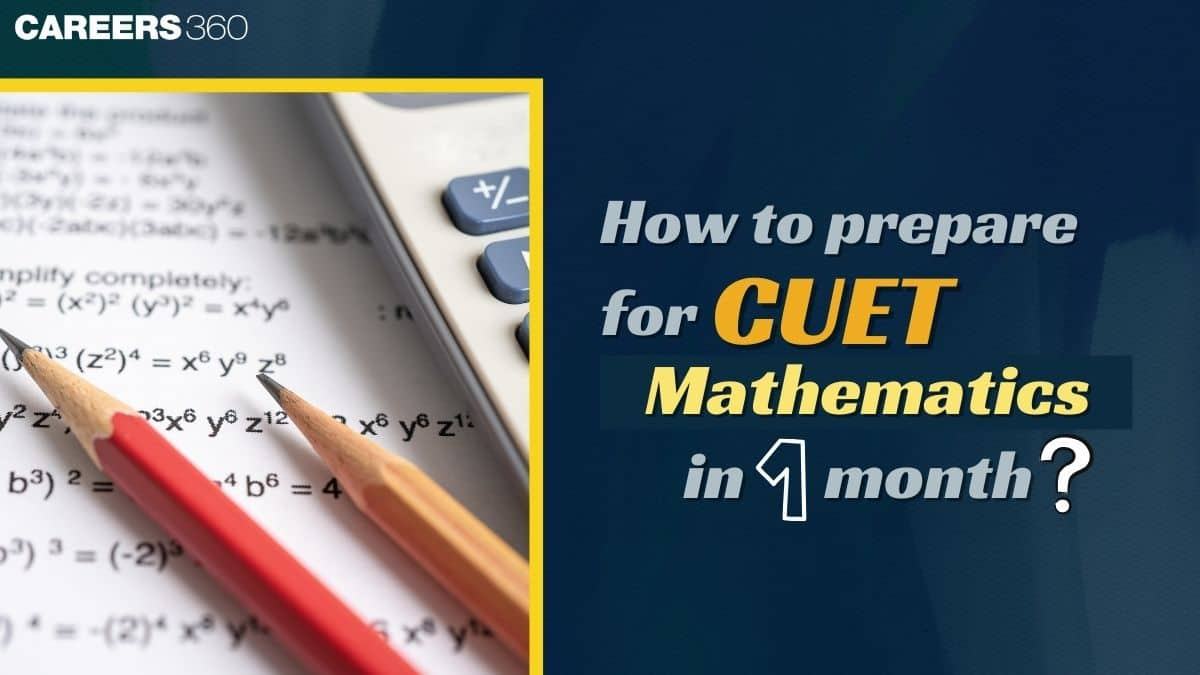
Due to the complexity of the CUET 2026 Mathematics, the examination demands a through and all-around preparation. Completing the entire CUET Mathematics syllabus 2026 in a month can be very beneficial for the candidates as this can provide them enough time to prepare for the CUET Mathematics examination through CUET Mathematics books and CUET Mathematics mock tests. Given below is a comprehensive day-by-day guide for the students to complete their CUET Mathematics syllabus in a month.
Day | Topics to Cover |
1 | Introduction to Continuity and Differentiability |
2 | Advanced Continuity and Differentiability + Examples |
3 | Application of Derivatives: Concept and Basic Problems |
4 | Application of Derivatives: Optimization Problems |
5 | Integrals: Introduction and Basic Integration Rules |
6 | Application of Integrals: Area Under the Curve |
7 | Differential Equations: Formation and Solutions |
8 | Differential Equations: Practical Problems and Applications |
9 | Matrices: Basics and Operations |
10 | Determinants: Properties and Applications |
11 | Relations and Functions: Introduction and Types |
12 | Inverse Trigonometric Functions: Properties and Examples |
13 | Statistics: Mean, Median, Mode |
14 | Statistics: Standard Deviation and Variance |
15 | Probability: Basics and Simple Problems |
16 | Probability: Conditional Probability and Bayes' Theorem |
17 | Three Dimensional Geometry: Points, Lines, and Planes |
18 | Three Dimensional Geometry: Distance and Angle Problems |
19 | Vector Algebra: Basics and Operations |
20 | Vector Algebra: Applications in 3D Geometry |
21 | Linear Programming: Introduction and Formulations |
22 | Linear Programming: Graphical Solutions |
23 | Mensuration: Volume and Surface Area Problems |
24 | Time, Speed, and Distance: Concept and Problems |
25 | Pipe and Cisterns: Basic and Advanced Problems |
26 | Number System: Properties and Problem-Solving |
27 | Ratio and Mixtures: Basics and Applications |
28 | Compound Interest and Depreciation: Concepts and Problems |
29 | Time Series Analysis: Understanding Patterns and Trends |
30 | Grand Revision: Practice Papers Covering All Topics |
Securing a good score in the CUET Mathematics may be challenging but is not unachievable. It required dedicated CUET Mathematics preparation. One of the first and foremost tasks that the candidates must do is to understand the CUET Mathematics syllabus. The candidates should ensure that they attempt the CUET Mathematics question paper with confidence. Below is the exam pattern of CUET Mathematics 2026.
The students must be aware of all the topics belonging to the CUET Maths before beginning CUET Mathematics 2026 in 1 Month preparation. According to the CUET Maths syllabus, the complete (not reduced) Class 12 syllabus will be considered for the CUET UG 2026 exam.
Clearly, students preparing for JEE/ NEET exams will cover the whole Class 11 and 12 syllabus, which makes it inconsistent and testing for the rest.
So, the first step is to figure out which chapters or topics are added for CUET in the NCERT Class 12 syllabus that has been reduced for all the boards. For this, we have compared and provided a roundup of all topics that should be covered (✔️) and not studied (❌) for IIT and NEET exams, and CBSE, ISC or UP Boards.
 Comparison of all topics and sub-topics from the CUET mathematics syllabus
Comparison of all topics and sub-topics from the CUET mathematics syllabus
Candidates can check the chart for the complete CUET Maths syllabus - Click here
As you can see in this chart (of Class 12 Maths Unit 1), several topics were reduced in CBSE, ISC and UP board syllabus.
Vector Algebra and Continuity and Differentiability chapters are seen to have most of its topics covered by all major boards of Class 12. This means that the NTA experts may ask more questions from these chapters.
The same is applicable for the Relations and Functions chapter from which 60% topics were deleted by all boards, so there is less probability of seeing many MCQs from it in the CUET paper.
The topics with a tick (✔️) next to them are included in the CUET and are also available in the respective syllabus - CBSE, ISC, UP board.
The topics with a cross (❌) next to them are included in the CUET but are reduced from the respective syllabus - CBSE, ISC, UP board.
Last Date to Apply: 25th Feb | Ranked #45 Among Universities in India by NIRF | 1950+ Students Placed, 91% Placement, 800+ Recruiters
Education World: Ranked 2nd in Jharkhand by Education World India Private Universities Ranking-2021
CUET aspirants should also check the chart of important chapters given below. It is prepared based on the NTA official CUET UG Maths mock test and the previous 4 years CUET papers (covering only Class 12 Maths syllabus).
This chart is formulated to provide an idea of all the MCQs asked from each unit or chapter.
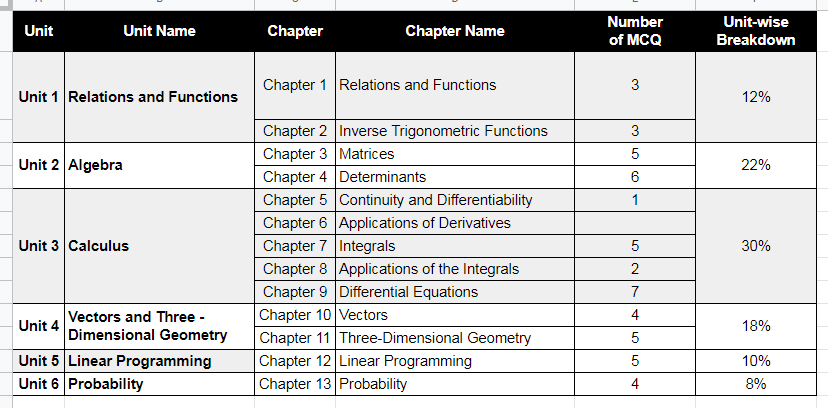 Unitwise, Chapterwise Weightage
Unitwise, Chapterwise Weightage
The key takeaways from the chart are
Unit 3 solely comprises 30% of the CUET paper, which means all chapters in this unit should be a priority for students.
Other than chapter 7 from unit 3, equal time should be focused on chapter 4.
Students can skip studying a couple chapters like chapter 5 and 6 as there are hardly any MCQs asked from them.
To save your time, figure out if you are comfortable answering all the questions except case-based MCQs. You can choose to skip answering them since there is a choice for up to 10 MCQs.
Once students are done analysing the CUET syllabus PDF, they can move on to dividing time for chapter-wise preparation. Given below are a few things that students must consider while setting up this schedule.
1. Chapter-wise Theory
Since only around a month’s duration is left for the CUET Maths exam, instead of going through all the NCERT concepts, students should go for a visual option to recall them. For this, we have mind maps (see screenshots below) for every single NCERT chapter (including the deleted ones from the board syllabus) that help students revise -
All NCERT topics and sub-topics
Important points, definitions and theorems
All formulas to solve MCQs
How to solve MCQs with practice of examples
India’s first liberal arts college to offer a four-year full time Bachelor of Arts and Bachelor of Science (Liberal Arts) Honours degree
Highly qualified faculty from diverse academic backgrounds. An interdisciplinary curriculum blending humanities, social sciences, and liberal arts.
2. Chapter-wise Practice
Next thing you need to consider for setting up a realistic timetable is a roundup and analysis of all the official resources available from NTA for CUET Mathematics 2026 in 1 Month preparation. We have figured out from the official NTA CUET mock tests that the paper pattern will be on a medium level. So, using NCERT Exemplars for additional preparation will be a safe bet because it covers all the NCERT topics.
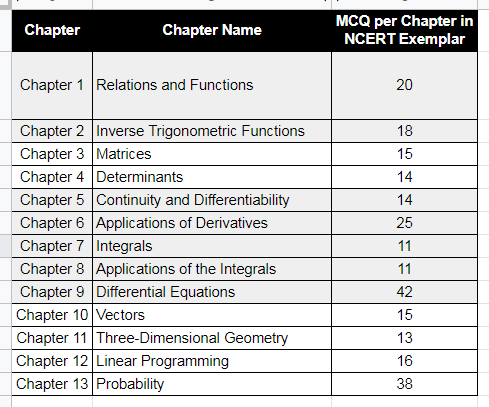 Chapterwise Weightage
Chapterwise Weightage
These questions include all different typologies of MCQs, like match the following, assertion/ Reason, standalone, etc. that students need to complete CUET Mathematics 2026 in 1 Month.
If you take a look at the CUET mock test paper below (provided in the CUET Maths Practice Book), there are different types of MCQs (standalone, statement-based, assertion/ reason, etc.) asked in the CUET exam now in comparison to the predecessor, CUET.
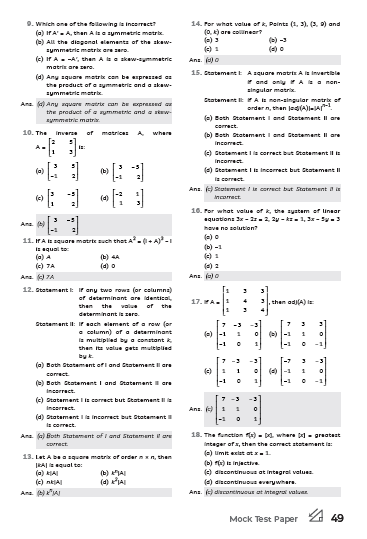
To practise NTA Official CUET Mathematics Mock Test (With Solutions) - Click here
The students should have a good strategy to prepare for CUET Mathematics 2026 in 1 Month, they should include two things: CUET Mathematics past years’ papers and CUET mock test papers (Solved and unsolved).
1. CUET Past Year Maths Papers
Until 2021, CUET was known as CUET, which was held once a year for 12 central universities only but on a similar MCQ pattern in CBT mode. By practising the CUET Mathematics paper, students can get an understanding of MCQ-type questions that were asked earlier. But a big challenge with these papers available online from other sources is that they were based on the complete Class 11 and 12 syllabus.
The CUET Maths Practice Book includes these papers only with the relevant Class 12 topics and MCQs.
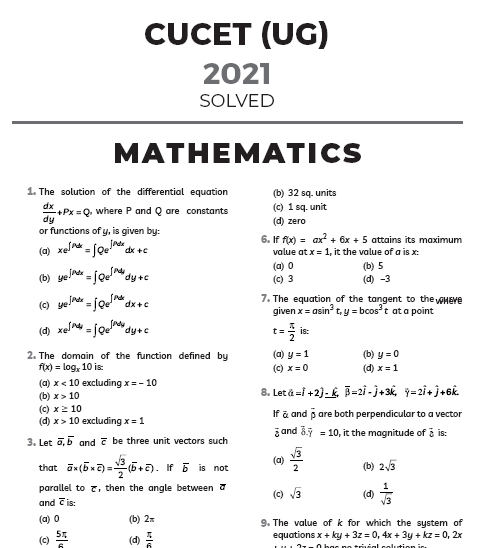
CUET Official 2021 Mathematics Paper (excluding Class 11 MCQs).
2. CUET Maths Mock Test Papers (8-10 Solved and Unsolved)
It is good to have access to CUET 2026 mock test papers, but it serves no purpose if they are not based 100% on the NTA official CUET mock tests. Students are recommended to practice solved and unsolved papers at least in the last 10-15 days of the CUET preparation.
Time management plays an important role in any examination. Students may get at least 1.5 to 2 hours to attempt 50 MCQs for MCQ-based board exams like CBSE term 1 or ISC semester 1 exam.
In order to find a solution for this problem, we have designed a time management chart for CUET aspirants to try and attempt all MCQs in their paper before time so they can actually revise and review their answers.
Typology | Total MCQs (5 marks each) | Time to be Spent |
Stand Alone | 35 MCQs | <1 min per MCQ |
Assertion/ Reason | 5 MCQs | 1 min per MCQ |
Choose the Correct Statement | ||
Match the Following | ||
Case-based | 2Q (5 MCQs each) | 2 min reading time + 1 min per MCQ |
Total Marks | 250 (50 MCQs) | 60 minutes |
After analysing the CUET Mathematics question papers of the previous year’s experts from Careers360 have shortened a list of the CUET most important topics for effective CUET Mathematics 2026 preparation in 1 Month. Referring to the CUET Maths PYQs can help the candidates understand the CUET Mathematics syllabus and exam pattern in more detail. The analysis is provided below:
Section | Important Topics |
Mathematics | Application of Derivatives Application of Integrals Continuity and Differentiability Determinants Differential Equations Integrals Linear Programming Matrices Probability Statistics Three Dimensional Geometry |
Here are a few tips that the candidates can follow to enhance their CUET Mathematics preparation for 2026.
Understanding of the CUET Mathematics syllabus and possible questions that may be asked is absolutely essential.
At least 3 hours of study time must be given for the CUET Mathematics 2026 in 1 Month.
The candidates should focus on conceptual clarity and refrain from mugging up the questions.
The candidates should create a timetable which is suitable for them and stick to it. Remember, consistency is the key.
The candidates should ensure that they engage in full-length and topic-wise mock tests during their CUET Mathematics 2026 in 1 Month.
The candidates should ensure that they revise formulas and concepts from time to time so that they can retain them whenever required.
Accuracy in CUET Mathematics is all about practice with precision. The paper usually has 85–100 questions, and every correct answer adds +5, while a wrong attempt costs 1 mark. This means even 10 silly mistakes can drop your score by 50. With focused revision, smart shortcuts, and regular testing, covering CUET Mathematics 2026 in 1 month is achievable.
Around 60–65% of CUET papers focus on Algebra, Arithmetic, and Geometry. Prioritise these in your CUET Mathematics Preparation in 1 month.
Solving the last 3–5 years’ CUET Maths questions helps you identify frequently repeated types.
Attempt 1–2 timed CUET Maths mocks daily to simulate real exam conditions and track accuracy.
Review every mistake to avoid repeating them, a proven way to raise CUET Maths scores by 20–25%.
Allocate at least 3 hours daily for CUET Mathematics 1 month preparation, dividing time between formulas, practice, and speed drills.
Retaining formulas, theorems, and problem-solving techniques is crucial for CUET Mathematics success. On average, students need to recall nearly 150–200 formulas during the exam, and memory slips can cost valuable marks. With smart revision tools and regular practice, even CUET Mathematics 2026 in 1 month can be tackled effectively if approached with discipline and structure.
Prepare a single-page sheet of Algebra, Trigonometry, and Calculus formulas; revise it twice daily to boost CUET Preparation in 1 month for mathematics.
Revise topics every 48 hours; this method improves retention by nearly 60% compared to passive reading.
Create short memory cues for sequences, theorems, or tricky identities; this simplifies CUET Mathematics 1 month preparation.
Dedicate the last 30 minutes of study to solving 15–20 rapid-fire questions; a proven CUET Maths preparation strategy in 30 days.
Follow a CUET Maths study plan for 1 month with 3 focused hours daily: 1 hour formulas, 1 hour problem-solving, and 1 hour timed practice.
A proper CUET Maths study plan for 1 month can help you complete the syllabus, retain key formulas, and practice enough to improve accuracy. With the exam carrying 85–100 questions, smart planning is essential. Many toppers prove that CUET Mathematics 2026 in 1 month is possible if you break the preparation into weekly milestones.
Revise NCERT Class 11 & 12 fundamentals, focusing on Algebra, Arithmetic, and Geometry.
Create formula sheets and practice 40–50 questions daily.
Dedicate time to Trigonometry, Probability, Calculus, and Statistics.
Solve 2–3 previous year papers to understand patterns.
Take 3 full-length CUET Mathematics mock tests in timed conditions.
Focus on the weak areas identified in Week 2.
Follow a CUET Maths preparation strategy in 30 days by dividing practice into speed drills and accuracy checks.
Revise all formulas daily using charts or flashcards.
Attempt at least 1 mock paper every alternate day.
This should answer how to prepare for CUET Mathematics in one month effectively.
For CUET Mathematics last minute preparation, avoid new topics and polish accuracy on solved questions.
Below are chapter-wise CUET Mathematics Practice Tests 2026, covering all important topics to help you master each concept, enhance problem-solving skills, and prepare effectively for the exam.
Frequently Asked Questions (FAQs)
Preparing for CUET in one month is definitely challenging but possible, especially if you already have a basic understanding of the subjects. With focused and intensive preparation, you can cover the key topics and practice enough to improve your chances. The key will be prioritizing important areas, taking mock tests, and managing your time well.
Prioritise high-weightage topics like Algebra, Coordinate Geometry, Calculus, Probability, and Trigonometry. These carry more marks and improve overall score quickly.
CUET Mathematics is of moderate difficulty. It’s not extremely tough, but it does require a good understanding of the Class 12th syllabus and the ability to apply concepts effectively. The questions are designed to test both your theoretical knowledge and problem-solving skills, so practicing regularly and understanding key concepts is important.
Yes, you can attempt the CUET exam multiple times. There is no restriction on the number of attempts for CUET; candidates can take the examination as long as they fulfil the eligibility criteria. However, it's important to note that the exam is conducted once a year, so you can only attempt it once per academic year.
At least 10–12 full-length mock tests are recommended. Start with one mock every two days, then switch to daily practice in the last 10 days before the exam.
On Question asked by student community
NTA has released the CUET UG 2026 application form on January 3 at cuet.nta.nic.in. Aspirants can fill and submit the CUET UG form 2026 till January 31. The candidates must provide their academic, personal, and contact information in the CUET UG 2026 application form. Prior to submission, it is important
A mismatch in father's name on official documents (like 10th marksheet vs. Aadhaar) will not lead to an immediate rejection of CUET application form, but it can cause significant problems during the document verification stage at universities. The National Testing Agency provides a CUET UG correction window to fix such
Hello
The application process for the Common University Entrance Test (CUET) UG 2026 has officially begun. The National Testing Agency (NTA) released the application form on January 3, 2026. If you want to join top central universities like Delhi University (DU), BHU, or JNU, you must apply before the deadline.
Hello
Yes, it is fine to choose Political Science and History as your domain subjects, English as your language, and GAT in CUET for BA Ancient Indian Culture & Archaeology at BHU. These subjects are fully accepted and will not affect your eligibility for the course.
Hello,
Yes, you can get a reservation to study B Tech. through cuet exam as per your category. It is partially dependent on the university you will get admission.
Thank You.
NAAC A++ Accredited | Ranked #12 by NIRF
NAAC A+ Accredited | Among top 2% Universities Globally (QS World University Rankings 2026)
Recognized as Category-1 Deemed to be University by UGC | 41,000 + Alumni Imprints Globally | Students from over 20+ countries
Among top 100 Universities Globally in the Times Higher Education (THE) Interdisciplinary Science Rankings 2026
Avail upto 100% Merit Based Scholarships
AICTE Approved | NAAC A++ | Category 1 University by MHRD | Highest CTC 1.4 Cr LPA from Amazon